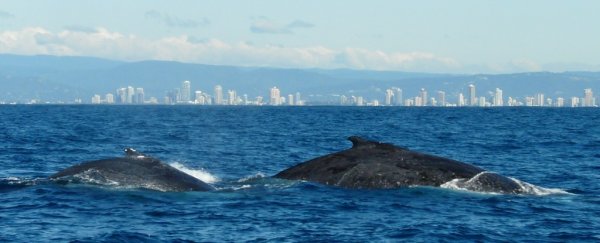Just in case you wanted to feel really sad today, scientists have discovered that at least seven species of marine mammals mourn the death of family or friends.
The study identified mammals that clung to the bodies of dead compatriots, and kept vigil over a dead companion. Although they can't determine for sure the cause behind this behaviour, the most likely explanation the researchers came to? The animals are grieving.
"The present study helps to corroborate that adults mourning their dead young is a common and globally widespread behaviour in long-lived and highly sociable/cohesive species of mammals," the researchers from University of Milano-Bicocca in Italy wrote in the Journal of Mammalogy.
The study compiled observations from 14 events, and seven different marine mammals: Indo-Pacific bottlenose dolphins (Tursiops aduncus); spinner dolphins (Stenella longirostris); killer whales (Orcinus orca); Australian humpback dolphins (Sousa sahulensis); sperm whales (Physeter macrocephalus); Risso's dolphins (Grampus griseus); and short-finned pilot whales (Globicephala macrorhynchus).
But why are these animals behaving like this, and why is it so widespread? Mourning a dead companion is a time intensive and costly action, which takes away from animals finding food, mating, and creating interactions with other live animals – so it doesn't make much sense from an evolutionary perspective. Which is why the researchers concluded that they're likely to be genuinely grieving.
"We found it is very common, and [there is] a worldwide distribution of this behaviour," says study co-author Melissa Reggente, in an interview with National Geographic's Traci Watson. "They are in pain and stressed. They know something is wrong."
But although the behaviour was common, the way these animals grieve is varied. Scientists in the Red Sea observed an Indo-Pacific bottlenose dolphin push a smaller, deceased dolphin through the water on its fin. The dolphin was badly decayed, and had probably been dead a while.
A killer whale, called L72, which had recently given birth, was seen carrying a dead newborn in her mouth.
"She was trying to keep the [dead] calf up at the surface the entire time, balancing it on top of her head," says study co-author Robin Baird from the Cascadia Research Collective in Olympia, Washington.
"The animals go through a period where they're experiencing the same kind of emotions you or I would when a loved one dies."
The study also found reports of ocean mammals touching the dead companions with their fins, and making a protective circle around an adult morning a dead calf.
This kind of behaviour makes it even sadder when we hear stories such as Wally the whale washing up on Californian beaches over and over, or marine animals dying as a result of humans trying to rescue them.
Although when we hear news like this, we have to be careful to get all the facts and not anthropomorphise the situations – sometimes what looks like grief can actually be thinly disguised horniness.
We'll just be over here in the corner if you need us – definitely not crying or anything.
This study was published in the Journal of Mammalogy.
